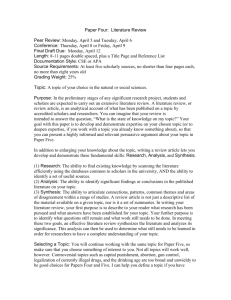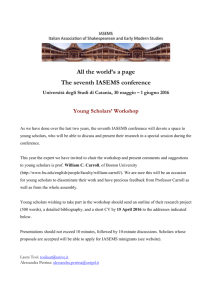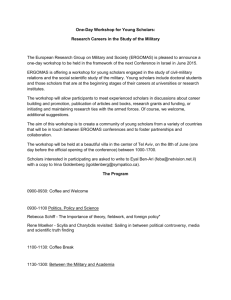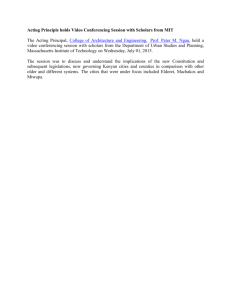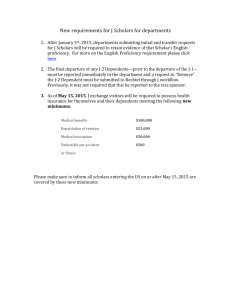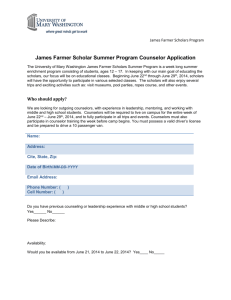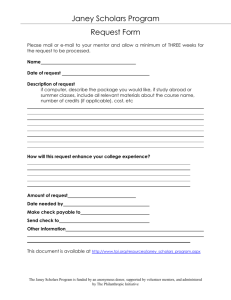Detailed DNB program description 2015-2016
advertisement
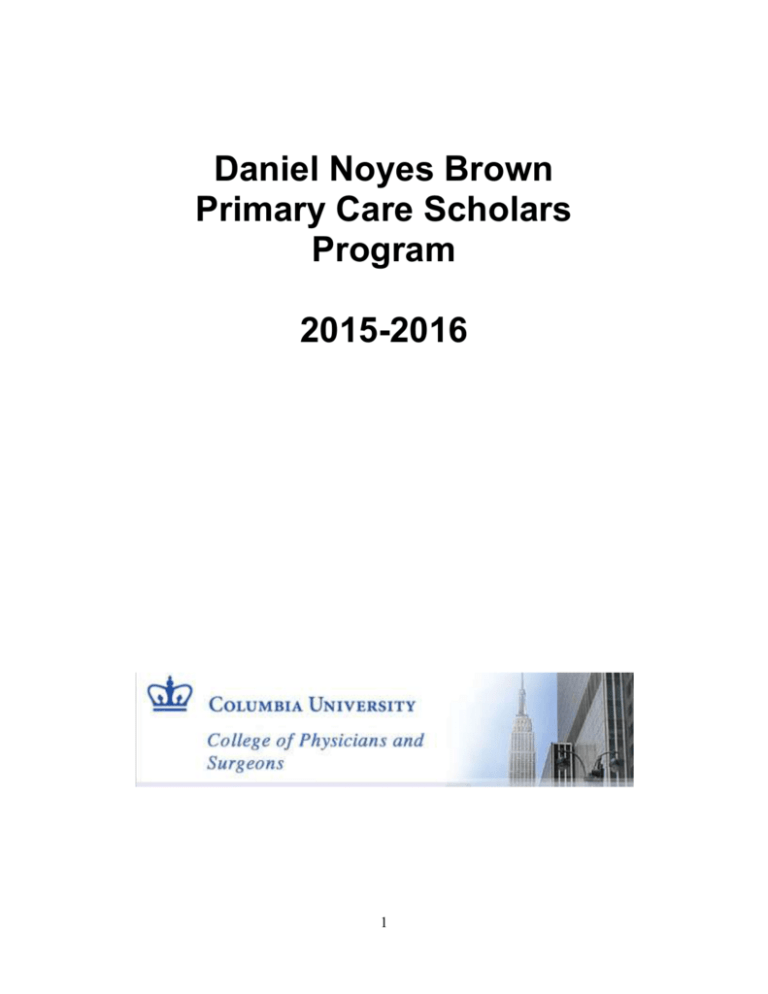
Daniel Noyes Brown Primary Care Scholars Program 2015-2016 1 Daniel Noyes Brown Primary Care Scholars Program Curriculum Overview Academic Year 2015-2016 Program Overview The Daniel Noyes Brown Primary Care Scholars Program is led by faculty from the Center for Family and Community Medicine, the Department of Pediatrics, and the Department of Internal Medicine. Together they partner in conceptualizing, planning, administering and teaching the curriculum and are represented on the endowment planning committee. The students’ medical learning home is based out of the Charles B. Rangel Community Health Center with Pediatrics and Internal Medicine and at the Denny Farrell Community Health Center with Family Medicine; the respective co-directors of this program at these sites are Drs. M. Christine Krause, Mary Anne Nidiry, Heather Paladine, and Anita Softness. The DNB Primary Care Scholars Program was developed in order to further enhance integration of primary care training over the four years of medical school while also providing exposure to the longitudinal care of patients. In this program, students complete all of their relevant clinical components of the traditional curriculum in the same two community based practices during their first three years of medical school. The curriculum parallels that of the school but students learn within the context of these primary care sites. At the current time, we cannot accept Bassett program students. Commitment to enter a primary care field is strongly considered during the application process. History of the Daniel Noyes Brown Primary Care Scholars Program Fifty six students have graduated from this program since the first students were selected in 1985. The program began as a scholarship and became an active curriculum in 1996. From 1996 to 2009, two students were accepted from each incoming first year class. From 2009 to 2014, four students were accepted from each incoming class. Beginning in 2014, the program expanded its admittance to eight students from the incoming class. Currently, there are 21 students enrolled in the program. The program is funded by a private endowment to the School of Medicine in honor of Dr. Daniel Noyes Brown. Dr. Brown was a graduate of the Class of 1932 of Columbia University College of Physician and Surgeons. He also completed his internal medicine residency training at Columbia-Presbyterian. Until World War II, he was in private practice as an internist in New York City. During the war he served in a Presbyterian medical unit providing medical care to the Allied troops in the then-Belgian Congo, North Africa and France. At the end of World War II, he co-founded the first medical group practice in New York State with the goal of providing the best comprehensive medical care to the surrounding 2 community. As an internist within a group of other specialists, he served as the primary point of care. Over 60 years later, the Mt. Kisco Medical Group, located 35 miles north of New York City in Westchester county, is thriving with over 270 primary care and specialty physicians. Dr. Brown’s wife, Mary Thatcher Brown, and his daughter, Cynthia Brown Lloyd, were major donors to the endowment along with numerous grateful patients, friends and family members. In recent years, since the death of Dr. Brown’s widow, his daughter Cynthia has taken a special interest in the management of the endowment. In particular, she works with the program faculty to assure that the goals of the program stay true to the original intention of encouraging students to pursue primary care medicine with the values and dedication to patient care that her father exemplified throughout his career. A recent donation from the Sulzberger family has allowed the program to double in size. Funding is available to DNB Primary Care Scholars to support a summer project between their first and second years of medical school as well as a scholarly project during their D & I year. The projects must be relevant to the fields of Primary Care and/or Community Health. Curriculum Goals: The goals of the DNB Primary Care Scholars Program are to: 1. Enhance the student’s foundation for future clinical practice in primary care with a medical home outside of the medical school. This medical home offers sustained exposure to urban primary care delivered to the community that surrounds the medical center. Student participants are taught how to deliver culturally sensitive and community responsive services in this urban setting. The program experiences emphasize the knowledge, skills, and attitudes that are at the core of longitudinal patient care and health care delivery. 2. Provide the student with the opportunity to develop longitudinal mentoring relationships with Primary Care faculty members. 3. Provide the student with unique experiences outside of the traditional curriculum and with opportunities to lead and participate in program sponsored journal clubs and peer mentoring sessions. Students also serve on the steering committee which meets twice yearly. 4. Provide support for scholarly work in Primary Care/Community Health. 3 Methods: First Semester Medical Students There will be an orientation to the program which will include information about community health research. Students will spend one session per week at their assigned practice, which will be the clerkship portion of the Foundations of Clinical Medicine I course. They will shadow clinical sessions with a primary care provider at the Rangel Community Health Center (an internist and/or a pediatrician) for 6 weeks and a family medicine physician at the Farrell Family Health Center for 6 weeks. Dr. Krause, Dr. Nidiry, Dr. Paladine, and Dr. Softness will coordinate these experiences. During each block, students may have additional opportunities to attend reproductive health sessions with Dr. Paladine and attend deliveries of the women they see in these settings. Students will also be able to spend one of their Rangel assigned sessions with a Columbia pediatrician, Dr. Minguez, who practices in a local school based health center. The first year DNB Primary Care Scholars students will also have opportunities to attend sessions led by upper class students to gain ideas for summer work between their first and second years. Second and Third Semester Medical Students Dr. Krause, Dr. Nidiry, Dr. Paladine, and Dr. Softness will be the faculty mentors for the Physical Diagnosis portion of Foundations in Clinical Medicine II and III (in the second and third semester, respectively). Students will have the opportunity to practice physical exam skills in a variety of clinical settings at both hospitalbased locations throughout New York Presbyterian as well as in an outpatient setting at Farrell. During this time, we will start introducing the basic concepts of clinical reasoning. The second year students will have opportunities to attend sessions led by upper class students to gather information about preparing for the major clinical year. The second year students will also serve as mentors for the first year Brown students. Additionally, Brown Scholars may apply for a summer stipend to support scholarly work in the field of Primary Care/Community Health between their first and second year of medical school. Major Clinical Year Medical Students Brown scholars will have their Primary Care clerkship (5 week rotation) at Farrell and Ambulatory Pediatrics clerkship (3 week rotation) at Rangel. We will focus on developing excellence in the art and science of history, physical exam and clinical reasoning, and begin the process of integrating them. The students have the advantage of knowing the faculty, staff and the system at each site as their medical home. 4 Fourth Year Medical Students Students will execute their DNB Primary Care Scholars Program sponsored scholarly project. This project will be approved by the Brown faculty and presented during the Brown Primary Care Scholars graduation celebration for students, families and faculty. Details about the project are outlined below. In addition, the funding from our program may also support conference attendance in order to showcase the student’s project. Additionally, during their D&I year, the Brown scholar students will lead a journal club for all P&S students on a primary care topic of their choice. The upper class Brown students will be asked to lead several mentoring sessions for first and second year students about summer work ideas, preparation for MCY year and residency applications. During their D&I time, Brown scholars will have the option to set up an elective month working with Dr. Nidiry or Dr. Krause. Primary Care Project Guidelines for Community Health / Clinical Research project: Project must be patient centered with a Primary Care/ Community Health focus. Projects may focus on educational research, quality improvement or narrative medicine in addition to traditional research methodologies. There are three options for the DNB Primary Care Scholars project: 1. It may fulfill the P&S curriculum requirement for the D&I year medical student scholarly project. 2. It can be a separate smaller project. 3. It can be a sub project that complements their main scholarly project. All projects must be approved by the Brown faculty to receive financial support. The Brown program financial support is also coordinated with the scholarly projects leaders of the medical school. Projects must be geographically based in Upper Manhattan or in the Bronx (the local communities served by Columbia University Medical Center) but may also include work in the Dominican Republic. 5 The students are expected to obtain IRB approval prior to implementation (there may be some exceptions to this requirement). Current plans include the development of a scholarly project database to help with future project design. Students will have the opportunity to hear about other Brown Scholars scholarly projects during several venues throughout the year. Students will have the opportunity to continue scholarly programs that have been created by former Brown Scholar students. Additional Opportunities for program participants Several sessions will occur each fall in which students can participate in didactics and community service learning experiences through the Community Pediatrics Program. These sessions will review the basic core concepts of Primary Care, solidifying for students an understanding of the biopsychosocial model for illness and health, as well as the importance of family and community centered care. Fall dinner for all DNB Primary Care Scholars and faculty. Spring graduation celebration for all DNB Primary Care Scholars, faculty and guests. DNB Primary Care Scholars Program Steering Committee student representation as well as representing the program at other medical school events. Evaluation: 1. Annual program evaluation 2. Student performance evaluation by DNB faculty utilizing the same evaluation system used for other P&S students. Please see the main web page for further information about current students, past scholarly projects and general quotes 6

